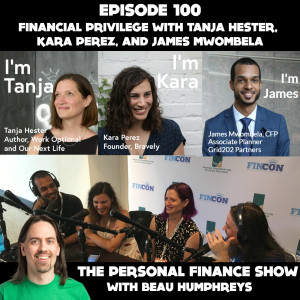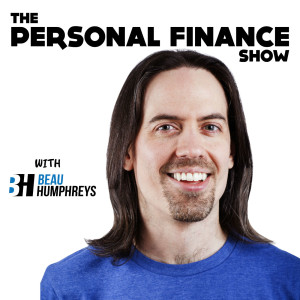
This is the 100th episode of The Personal Finance Show!
My special guests today are Tanja Hester and Kara Perez, the hosts of my favourite podcast, The Fairer Cents, and James Mwombela, who is a CFP and Associate Planner at Grid 202 Partners.
Episode 100 isn’t about someone’s personal finance story. It’s about an important personal finance topic.
Today’s topic is financial privilege.
My goal with this episode was to encourage you to think about privilege and how it affects your life and your finances.
Most people understand obvious financial privilege.
If you come from a wealthy family, you have an easier time than someone who doesn’t come from money.
Having to work as a teenager to pay bills is very different than choosing to work as a teenager to buy the things your parents won’t buy you.
Graduating with student loans puts you in a very different financial starting position from someone who’s parents saved up and paid for their schooling.
Working to save for retirement is very different from working to pay your bills and make the minimum payments on your credit cards.
But as we discussed in the episode, there are also less obvious layers of privilege, like your gender, the colour of your skin, or whether you are an immigrant, which may affect your ability to make money.
Like Darryl Brown from episode 93 of the show who didn’t think that anyone would want him to be their financial advisor because he’s black.
Or Nico Barawid from episode 67 who’s parents were both doctors, but were discriminated against financially because they had immigrated from the Phillipines.
There is still a lot of work to be done to increase Indigenous people's access to culturally relevant financial education resources, as Bettina Schneider and I discussed in episode 95.
Women are 80% more likely to live in poverty in retirement than men, as Saijal Patel mentioned in episode 77. This is not surprising if you consider that women only gained the right to open a bank account in the 1960s. The Equal Credit Opportunity Act was only enacted in 1974, which made it unlawful for a creditor to discriminate against any applicant on the basis of race, gender, religion, national origin, marital status, or age.
Think about that for a second - 45 years ago, it was so normal to financially discriminate against anyone who wasn’t a white male, that they actually had to make a law to tell financial institutions to stop being racist and sexist. On the other hand, white men have been able to open bank accounts and get credit since banks were invented hundreds of years ago. And it’s not like everyone stopped being racist and sexist on the day the law came out. As we discussed in the episode, this discrimination still exists, though it’s not as explicit as it once was.
I’ve never met anyone who doesn’t think this is a problem. There isn’t anyone I know who would explicitly say that they don’t believe everyone should have equal opportunity to make money and build wealth.
So let’s do something about it.
Let’s talk about it on podcasts like this.
If you have the opportunity to use your privilege for good, to help someone who might have less advantages than you, do that.
Remember that privilege is just perception. There’s no logical reason why gender or race or all of the other differences we mentioned should impact your ability to make money. It’s all in our heads and to stop it we need to change our thinking and our actions.
So that’s my 100th episode. I’ll be back soon with new episodes so if you haven’t subscribed to the podcast, please do that now, so you know when the new episodes are up. If you liked this episode, check out the other 99 episodes and please leave me a review on Apple Podcasts. And if you have any questions or just want to say hello, you can always email me at beau@beauhumphreys.com.
Click here to become a patron of The Personal Finance Show via Patreon
More Episodes
 2022-09-02
2022-09-02
 1.4k
1.4k
 2021-04-11
2021-04-11
 1.6k
1.6k
 2020-08-04
2020-08-04
 1.5k
1.5k
 2020-07-26
2020-07-26
 548
548
 2020-07-19
2020-07-19
 379
379
 2020-07-12
2020-07-12
 384
384
 2020-07-05
2020-07-05
 208
208
 2020-06-28
2020-06-28
 220
220
 2020-06-21
2020-06-21
 220
220
 2020-06-14
2020-06-14
 279
279
 2020-06-07
2020-06-07
 265
265
 2020-05-31
2020-05-31
 253
253
 2020-05-24
2020-05-24
 236
236
 2020-05-17
2020-05-17
 253
253
 2020-05-10
2020-05-10
 235
235
 2020-05-03
2020-05-03
 280
280
 2020-04-26
2020-04-26
 310
310
 2020-04-19
2020-04-19
 314
314
 2020-04-12
2020-04-12
 337
337
 2020-04-05
2020-04-05
 309
309
Create your
podcast in
minutes
- Full-featured podcast site
- Unlimited storage and bandwidth
- Comprehensive podcast stats
- Distribute to Apple Podcasts, Spotify, and more
- Make money with your podcast
It is Free
- Privacy Policy
- Cookie Policy
- Terms of Use
- Consent Preferences
- Copyright © 2015-2024 Podbean.com






